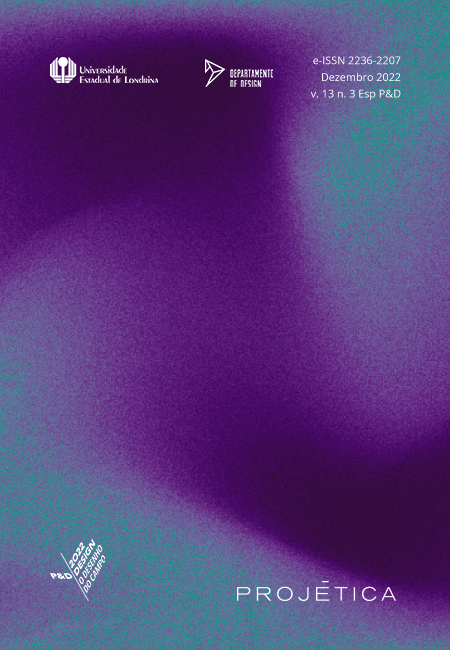Industry 4.0 and the main impacts for the field of design and innovation management:
a literature review
DOI:
https://doi.org/10.5433/2236-2207.2022v13n3p81Keywords:
Design, Industry 4.0, Innovation, TechnologyAbstract
This article presents an exploratory research that reflects on the meaning of industry 4.0 for the field of design, as well as what are its main impacts on innovation management and the development of new products and services. The theme is investigated from a qualitative approach, essentially based on a review of the specialized literature combined with a systematic review (SR) that results 377 publications. Were considered publications where industry 4.0 technologies were preponderant factors for differentiating companies. The study mapped the impacts of Industry 4.0 on the innovation process, the characterization of smart connected products, the identification of new emerging business models, the aspects of the third wave of competition driven by information technology, design management in the context of Industry 4.0, the integration between design and smart production and some approximations between technology and the role of the professional designer.
Downloads
References
CARDOSO, R. Design para um mundo complexo. [s.l.] Ubu Editora LTDA-ME, 2016.
CGEE. Segmentos ou nichos com maior potencial para o desenvolvimento tecnológico nacional. (Série Documentos Técnicos, 31). Brasília - DF: [s.n.].
FLUSSER, V. O mundo codificado: por uma filosofia do design e da comunicação. [s.l.] Ubu Editora LTDA-ME, 2017.
GARCÍA FERRARI, T. Design and the Fourth Industrial Revolution. Dangers and opportunities for a mutating discipline. The Design Journal, v. 20, n. sup1, p. S2625–S2633, 2017. DOI: https://doi.org/10.1080/14606925.2017.1352774
GERLITZ, L. Design management as a domain of smart and sustainable enterprise: business modelling for innovation and smart growth in Industry 4.0. Entrepreneurship and Sustainability Issues, v. 3, n. 3, p. 244, 2016. DOI: https://doi.org/10.9770/jesi.2016.3.3(3)
KAGERMANN, H. et al. Recommendations for implementing the strategic initiative INDUSTRIE 4.0: Securing the future of German manufacturing industry; final report of the Industrie 4.0 Working Group. [s.l.] Forschungsunion, 2013.
MANZINI, E. Design: quando todos fazem design: uma introdução ao design para a inovação social. Tradução Luzia Araujo. São Leopoldo, RS: Ed. Unisinos, 2017.
NIEWÖHNER, N. et al. The impact of the 4th industrial revolution on the design fields of innovation management. Procedia CIRP, v. 91, p. 43–48, 2020. DOI: https://doi.org/10.1016/j.procir.2020.02.149
PORTER, M. E.; HEPPELMANN, J. E. How smart, connected products are transforming competition. Harvard business review, v. 92, n. 11, p. 64–88, 2014.
SACOMANO, J. B. et al. Indústria 4.0. [s.l.] Editora Blucher, 2018.
SCHWAB, K. A QUARTA REVOLUÇÃO INDUSTRIAL. 1a Edição ed. São Paulo: Edipro, 2016. v. 4
ŚLUSARCZYK, B. Industry 4.0: Are we ready? Polish Journal of Management Studies, v. 17, 2018. DOI: https://doi.org/10.17512/pjms.2018.17.1.19
Downloads
Additional Files
Published
How to Cite
Issue
Section
License

This work is licensed under a Creative Commons Attribution 4.0 International License.
Projética está licenciada sob a Creative Commons Attribution CC-BY 4.0 International. Os autores detém os direitos autorais e concedem à revista o direito de exclusividade de primeira publicação.
Os autores dos trabalhos aprovados autorizam Projética a, após a publicação, ceder seu conteúdo para reprodução em indexadores de conteúdo, bibliotecas virtuais e similares.
Os autores assumem que os textos submetidos à publicação são de sua criação original, responsabilizando-se inteiramente por seu conteúdo em caso de eventual impugnação por parte de terceiros. As opiniões emitidas pelos autores dos artigos são de sua exclusiva responsabilidade.
A revista se reserva o direito de efetuar, nos originais, alterações de ordem normativa, ortográfica e gramatical, com vistas a manter o padrão culto da língua e a credibilidade do veículo. Respeitará, no entanto, o estilo de escrever dos autores. Alterações, correções ou sugestões de ordem conceitual serão encaminhadas aos autores, quando necessário. Nesses casos, os artigos, depois de adequados, deverão ser submetidos a nova apreciação. As provas finais não serão encaminhadas aos autores.











